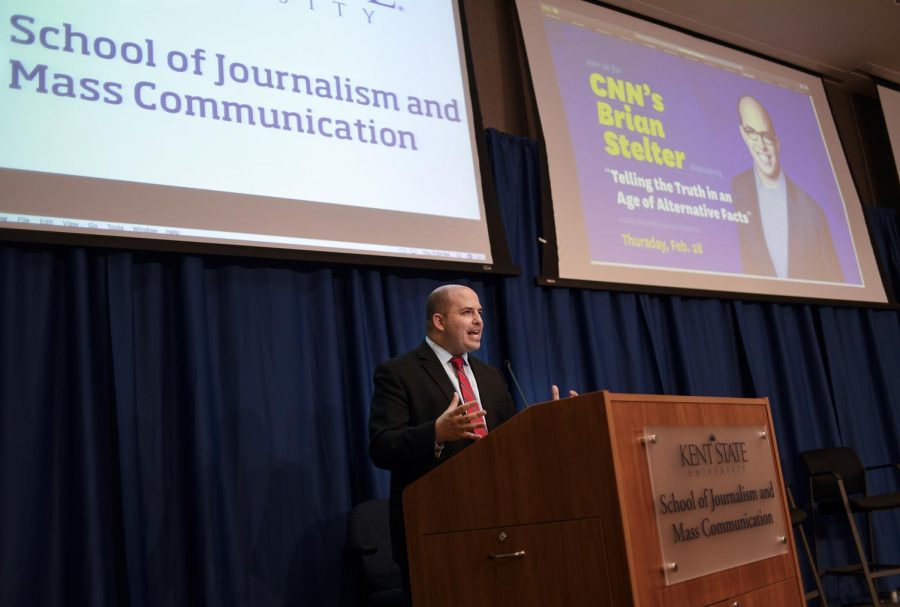CNN correspondent discusses fake news, ethics of journalists as part of lecture series
Brian Stelter, senior media correspondent for CNN ,speaks in Franklin Hall room 340 as part of the David and Janet Dix Media Ethics Lecture on Thurs., Feb. 28, 2019.
February 28, 2019
Brian Stelter, a CNN senior media correspondent, told Kent State students and faculty about bringing trust back in the era of fake news.
Stelter, host of the CNN show “Reliable Sources,” spoke to room full of students, faculty, staff and community members in Franklin Hall on Thursday. His discussion was part of the first annual David and Janet Dix Media Ethics Lecture.
His 11 tips for ethical journalism included triple checking information before publishing, transparency and taking time to reflect on coverage and yourself as a reporter.
Stelter also talked about staying human while being a journalist in today’s world.
“There’s obviously a transactional element when you’re working with sources and you’re trying to get information whether on deadline or an emergency or trying to expose wrongdoing,” he said. “We have to make it more than that transaction.”
Ethical journalism is recognizing that you’re working with people, sometimes scared, vulnerable and hurt people, he said.
“Stay on the outside, but with a good view,” is Stelter’s advice when it comes to power in the journalism world.
“Stay close enough to the power to be able to challenge it, but you don’t want to be close enough to be seduced by the power as well,” he said.
Stelter only mentioned Donald Trump very briefly throughout his lecture, referring to him as the “T-word.”
He answered questions from the audience, Twitter and journalist and professor Connie Schultz once his lecture came to a close.
The discussion intensified when Millie Weaver, an InfoWars journalist, began asking Stelter questions about CNN’s “unethical journalism.”
Stelter said that Weaver’s question is very important in newsrooms, and his response clarified the issue between CNN and InfoWars’ director and publisher, Alex Jones.
“What CNN did last year is ask Facebook and Twitter, ‘Doesn’t this content violate your rules against misinformation and fake news?’ And obviously Alex Jones does violate those rules, and Facebook started to take down Infowars,” Stelter said.
Earlier in the day, Stelter visited Kent State’s student newsroom located in Franklin Hall, where he also took questions from students. He told students how to transform their work to fit the digital era and what it’s like to be a reporter in today’s society.
When it comes down to credibility and how to establish if your sources are credible, he told students that gaining trust within your field and with the people around you is the easiest way to establish strong credibility.
“All of us have a bank of credibility— first as a father, wife, girlfriend, friend— we all have a bank of credibility,” Stelter said. “We make withdrawals and we make deposits. Hopefully we gain credibility in our personal lives and in our professional lives.”
Olivia Herold is the CCI reporter. Contact her at [email protected].

























